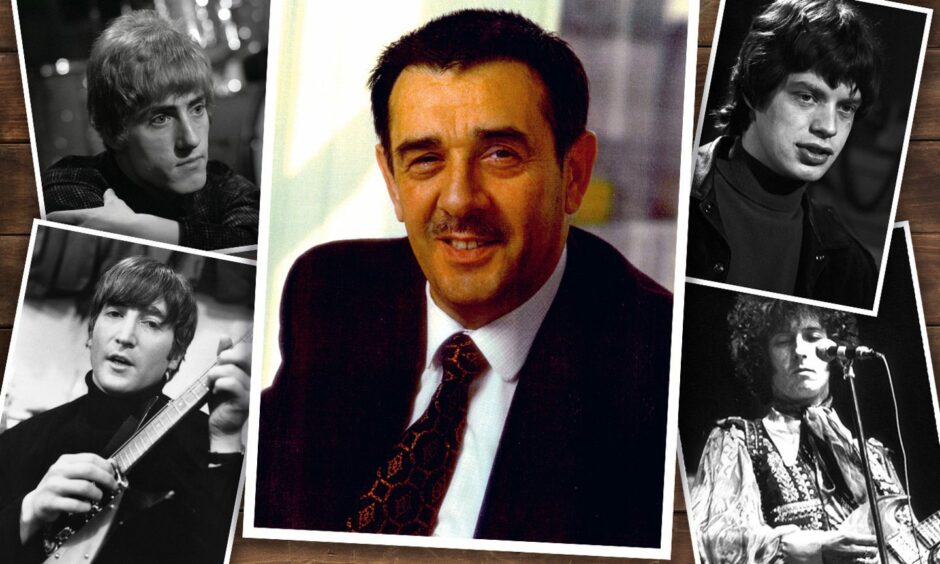
If you danced the nights away in Elgin in the 1950s, or went to see some of the biggest acts of the 1960s anywhere in the north from Banff to Orkney, you have one unassuming man to thank.
Invernessian Albert Bonici, who brought not only The Beatles to the north, but The Rolling Stones, The Who, The Kinks, Lulu, Cream, Jeff Beck, Pink Floyd, Eric Clapton, The Hollies, The Animals, The Moody Blues, Anita Harris, Kenny Ball… the roll call goes on.
He wasn’t your idea of a slick, fast-talking, cigar smoking impresario, according to The People’s Journal in 1965, “but a roly-poly gent in a thick woolly cardigan, bristly crew cut and rather sad expression”.
He attributed his visionary judgement as to which act was going to be big in future to the young people who came to see them.
“I let the youngsters choose for me,” Albert told The People’s Journal from his adopted hometown of Elgin. “I simply watch for their reactions to new names and follow up by attempting to book them.
“The youngsters in my area are as ‘with-it’ as any and I respect their judgement.”
Albert Bonici’s Elgin roots
Albert Anthony Bonici was born in 1920 in Inverness to Italians Guiseppi and Angela Bonici.
He had three siblings, Rossana, Giulia and Adolpho.
Albert was sent off to boarding school at St Joseph’s College in Dumfries, standing out for his wide-ranging intelligence.
His parents returned to Italy in 1923, but came back to settle in Elgin in 1938 where they opened The Soda Fountain.
Another family member opened the Park Cafe and the Bonicis worked together to grow the restaurant business which included making their own ice cream.
Albert gained a degree in electrical engineering and followed that path for a short while, but his love of jazz, swing and dancing was irrepressible.
He said: “My wife and I were keen dancers, but we had to travel to the Northern Meeting Rooms in Inverness to see the big bands, because they only did the major centres.
Pools win changed his life
“The circuit was something like: Monday, Edinburgh Palais; Tuesday, Dundee Palais; Wednesday, Beach Ballroom, Aberdeen; Thursday, Northern Meeting Rooms Inverness; and Friday and Saturday, Green’s Playhouse in Glasgow.
“No one wanted to know about Elgin.”
Albert’s unusual attitude to a pools win ended up changing his life completely.
He explained: “I used to pay 2s 6d a week to a Murphy’s pools agent, who filled out the coupon.
“One week, I won a few hundred pounds which was quite a lot of money – and it made me feel uneasy.”
It’s not clear why Albert felt uneasy about his win. A few hundred pounds in the 1950s would have been enough to buy a house.
Albert went on: “I decided to cancel the coupon and a young journalist named Henry Robertson who worked on the Elgin Courant got to hear of this.
“He was a good musician who had been to university but had developed TB and was writing newspaper articles while he recuperated in Elgin.
Albert’s break into showbiz world
“We became good friends and to help him raise money to stage the music shows which he put on in local church halls, I organised a Valentine’s Day dance.
“It made a fair bit of money.”
The young journalist would go on to become Harry Robinson, leader of Lord Rockingham’s XI and wrote their massive 1958 hit ‘Hoots Mon’.
He worked alongside Albert on promotions, while packing out the Park Cafe with his own piano recitals.
Albert’s next break was through his brother-in-law Ugo Ruggeri who had a connection with the London agent Tito Burns.
Burns promised that the Ray Ellington Quartet would come north if three venues could be found.
This was no problem for the budding impresario.
Albert said at the time: “There was still a great demand for dancing at this time so it was not a terribly great risk.
“The big bands toured once a month so I put the Ellington Quartet in between visits.
“They did the Beach Ballroom on a Wednesday, the Assembly Rooms Elgin on a Thursday, and Forres on a Friday. It was a big success.”
In 1960, Albert opened his own dance hall, connected to the Park Cafe, and called it the Two Red Shoes after the 1948 film of the same name.
Contract with The Beatles
There was no stopping him now— but far from being a one-trick jazz pony, Albert opened his ears to emerging pop trends.
He told the media: “I was a jazz man and didn’t really listen to the pop groups much.
“On the Monday, I travelled to Aberdeen Station and was picked up by my associate, Gordon Hardie.
“We went as usual to Chivas Restaurant in Union Street, only this time we were surrounded by waitresses clamouring, “Who are these Beatles?”
“The group had apparently visited the restaurant earlier in the day and made a great impression.
“I don’t know if it was their personalities or the smart blue suits and rain coats into which the name “Beatle” was sewn, but they had certainly impressed the girls, and that made an impression on me.’
Elgin musician Mark Aldridge is also a great admirer of Albert Bonici, and in awe of his acumen over The Beatles contracts.
The height of Beatlemania
“The most extraordinary element of the story is that Bonici’s initial contract also gave him rights to promote their next tours in Scotland.
“So he organised and promoted the October 1963 tour, and finally co-promoted the April 1964 with Brian Epstein.
“This included dates in Glasgow and Edinburgh with Buckie’s Johnny and The Copycats, managed by Bonici, supporting The Beatles at the height of Beatlemania.
“Albert Bonici’s part in The Beatles story and Scotland’s ’60s music scene is sadly overlooked, and that’s a shame as he was a gifted, forward-thinking music-loving entrepreneur and he did it all from his office above his cafe in Elgin here in the north-east of Scotland.”
Albert’s extraordinary life caught the eye of Elgin man David Dills who has created deep-delving blogs about Bonici and his era.
Originally from California, David grew up loving British beat music.
Albert Bonici ‘had drive and intelligence’
When his heart drew him to Elgin to marry a local girl, and he heard The Beatles had done their first ever tour in the area, he started researching, and discovered the magic and influence of Albert Bonici.
He’s created a blog about the inspirational impresario.
“Besides being level-headed in dealing with others, Albert had drive and intelligence in interactions besides his compassion and community spirit,” David said.
“He drove a second-hand car, lived in a family-owned flat above the cafe and dance floor.
“He usually worked 12 to 15 hours a day, managing several family businesses while his wife Betty, sisters and brother-in-laws Ugo Ruggeri and Stanley Williamson, helped with various aspects of family businesses.
“Albert was known as a generous man who was considerate when it came to friends, family, and employees though finances were often a struggle with investments spread over several business including construction of the Eight Acres Hotel.”
Booking The Bay City Rollers in the 1970s
Albert’s nephew John Ruggeri now runs The Copy Shop in Elgin.
He remembers heady days in the early 70s when he worked with his uncle Albert in the promotions business.
“I helped book bands, book the halls, run dances and so on. It was hard work.
“We had The Sweet, Marmalade and the Bay City Rollers, in fact we booked a gig for them in Tain after their first hit.
“I learned a lot from Albert from the point of view of business, in particular not to be so trusting.
“Albert could be cantankerous, and I soon learned that if I wanted something done a particular way, the way to get it was to suggest the opposite to my uncle.
“We got along fine, with very few fall outs.”
But the times they were a-changing, and by 1975, Albert decided he’d had enough.
The big bands had realised they could circumvent promoters and sell the tickets themselves.
Discos took over
Then came discos, much cheaper than live music.
The Bonicis, who by now had The Eight Acre Hotel, adapted by putting in a disco dance floor, but the music promotion days were over.
There were plenty of other businesses in the family to keep Albert occupied, including the hotel and the franchise for the Mr Whippy vans in the north.
Kindness
John Stewart of Johnny and The Copycats/My Dear Watson remembers his kindness in the early days.
“Albert came to see us one of the times we were in Germany performing at the Storyville in Frankfurt.
“Conveniently there was an Italian restaurant two doors away and of course we ate there.
“Albert had a long conversation with the owner and he introduced us to some of the finer choices in Italian food.
A genuinely thoughtful person
“Albert wanted to look out for us in every aspect, even our eating habits… He was a genuinely thoughtful person who wanted to be fair with others and I never saw him loose his cool even under the most difficult circumstances.
“He was juggling a lot of balls trying to keep everyone happy and we know that’s impossible.”
Albert died suddenly in 1990, just shy of his 70th birthday, his loss to Elgin and the north-east unfathomable.
More like this:
When The Beatles struggled to find fans in Elgin and Dingwall
Paul McCartney at 80: Ex-Beatle’s bliss in Scotland despite bad vibes in Aberdeen
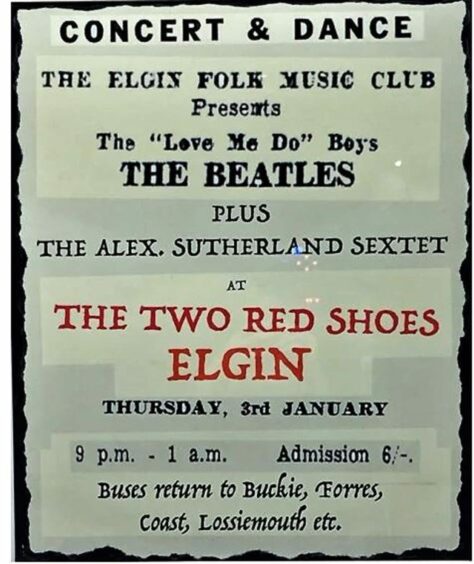
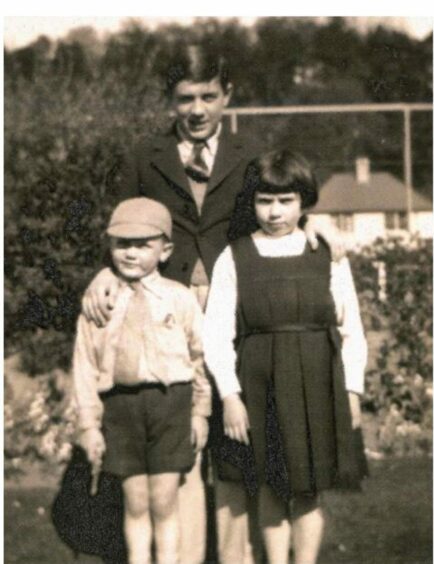
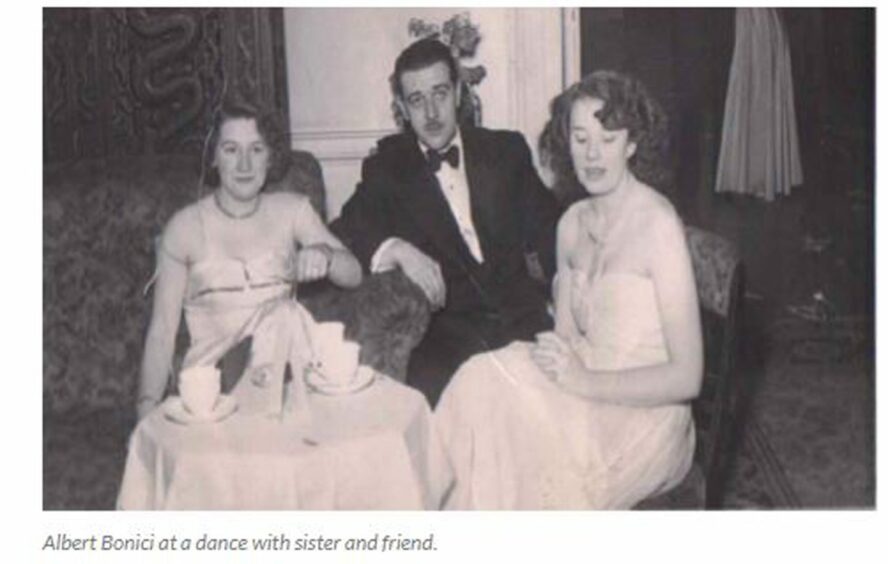
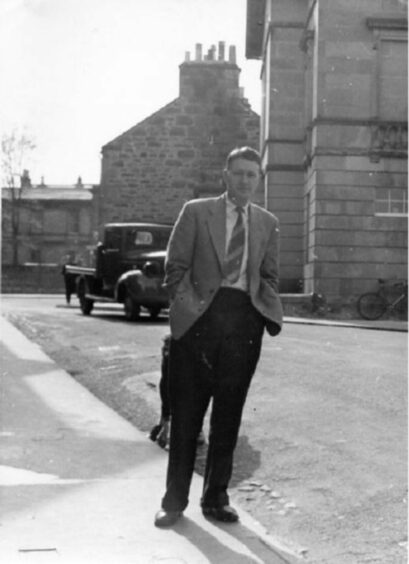
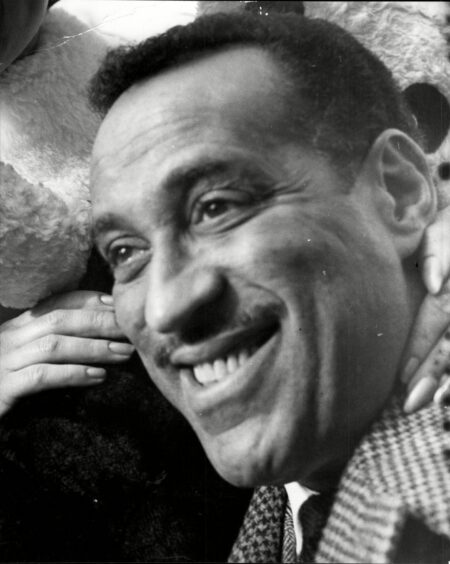
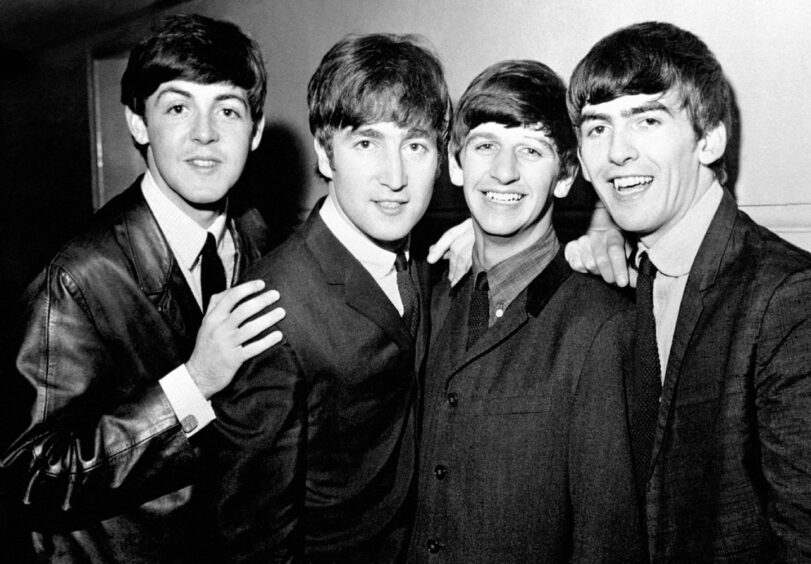
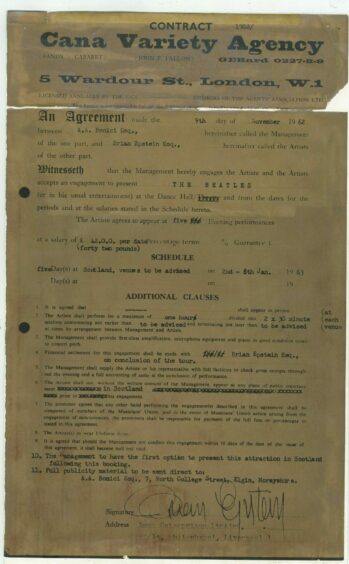
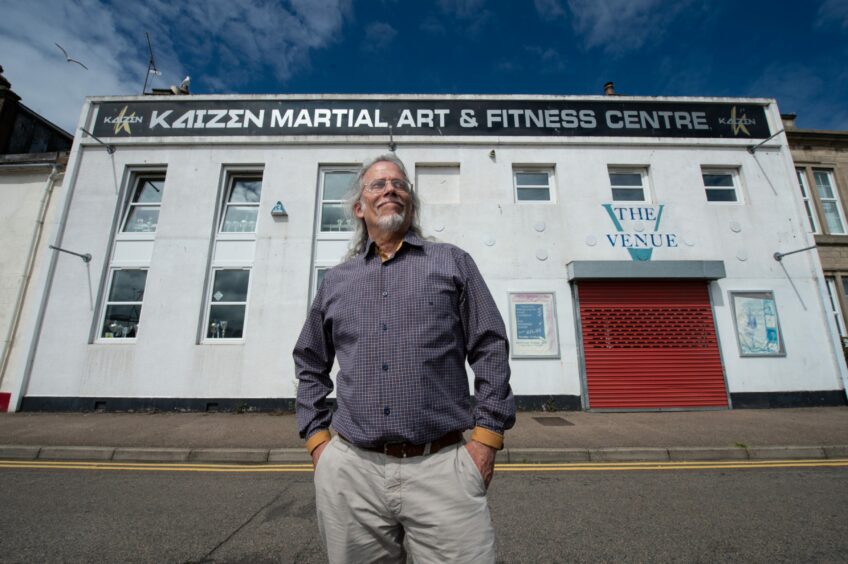
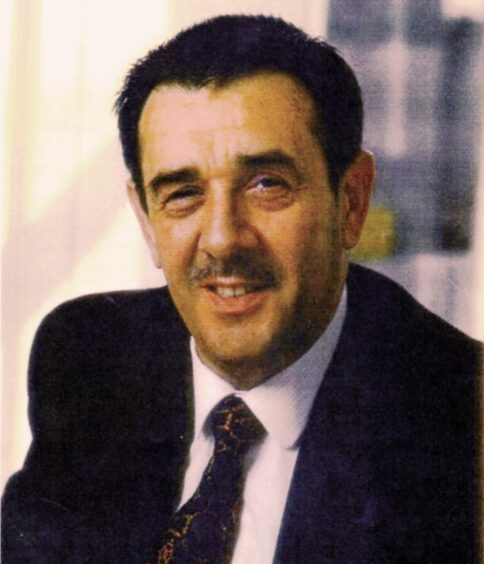
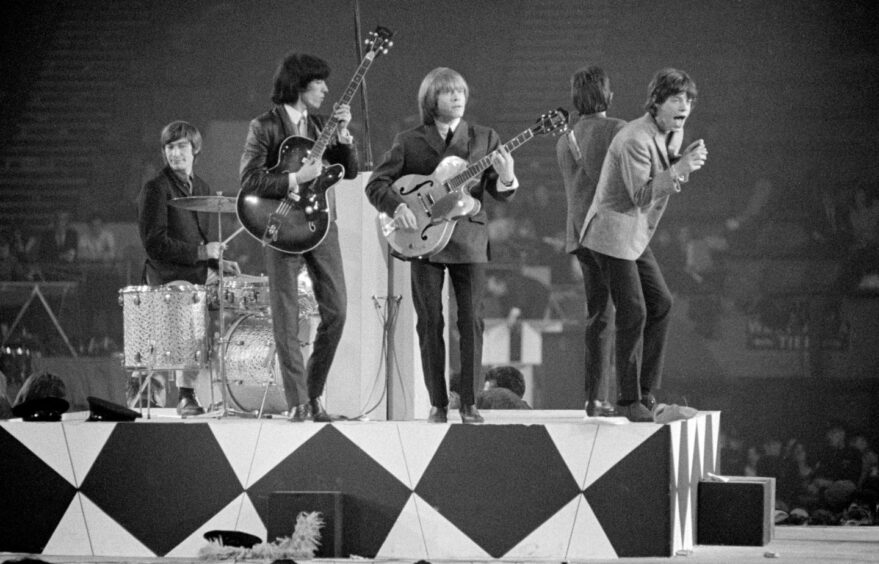
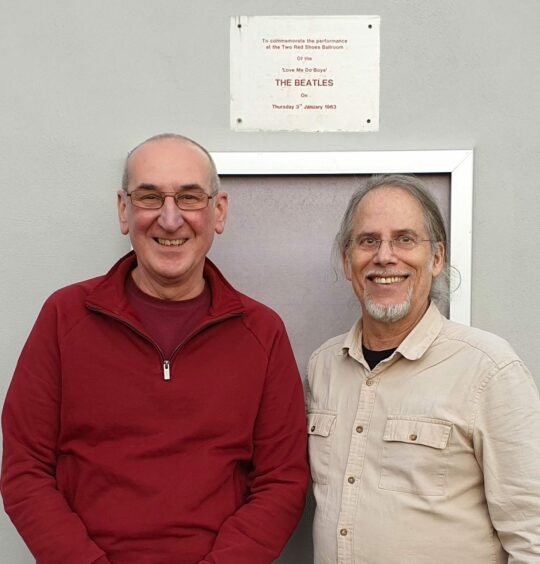
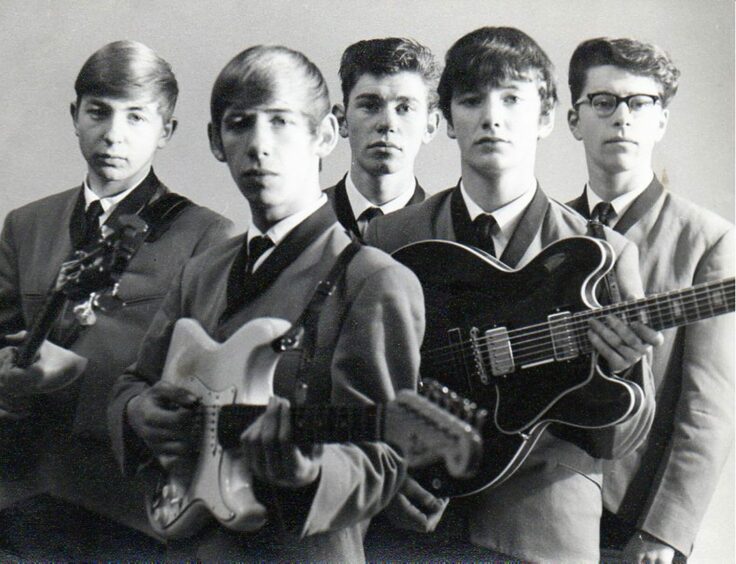
Conversation